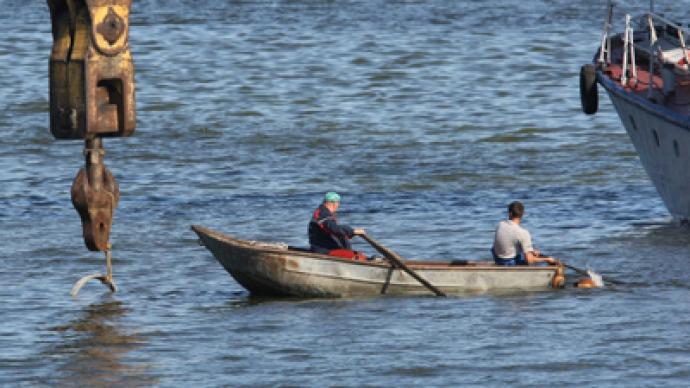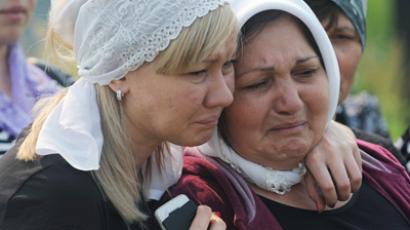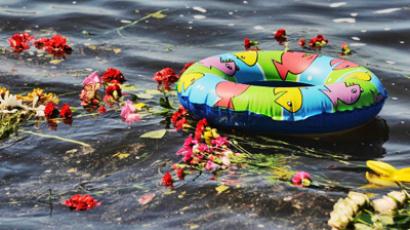Operation to raise Bulgaria from riverbed underway

As the doomed cruise ship Bulgaria remains underwater, Russian emergency crews are to restart efforts to recover it. The ship sank in a storm on the Volga River on June 10, killing 114 people and leaving 15 missing.
A cable supporting the ship snapped as divers and crane teams were trying to right the ship which sank on its right side. Luckily there were no divers nearby as the cable whipped against the side of the crane-ship.A spokesman from the Emergencies Ministry said it is going to take many days before they even start raising the Bulgaria.Two enormous cranes with cables attached to them are at the site of the accident on the Volga River. Once they are able to right the vessel they will start to raise it."It is a long process. It will take not one hour," Deputy Transport Minister Viktor Olersky, who is overseeing the operation, told the Interfax news agency late on Saturday.“The whole lifting operation consists of four phases,” Olersky said. “Phase one is to fix the hoists; phase two, to put the sunken vessel on the even keel; phase three, to raise the vessel and finally phase four ,to transport the ship to the dock,” he explained.The speed of the tragedy and the way the pleasure boat sank complicates the operation in many ways.As the ship went down on its right side, the divers will have to go underneath it to check whether the vessel is structurally sound enough to cope with the salvage process. They will also try to look for the bodies of 15 victims who are still missing.As the cranes start to raise the ship, the divers will have to find and seal gaps in the vessel. Once the Bulgaria is partially raised, they will be able to pump water out, making the ship lighter and more buoyant, thus making the operation easier.Low visibility in the water of the Volga’s biggest and deepest reservoir is also complicating the divers’ work.The recovery of the sunken cruise ship is crucial process for the investigators, relatives of the victims and survivors, who are all looking for answers to the causes of the tragedy. Some arrests have already been made, including the head of the company which operated the boat, and the inspector who certified it as fit to sail. They will face charges of negligence that led to numerous deaths.Seventy-seven people (among them 49 divers) and 19 ships are taking part in the salvage operation. All in all, more than 800 people are involved in raising Bulgaria from the Volga bed.So far the operation headquarters, which is investigating the accident, has no theories. "Initially we thought that its port side bumped against some obstacle under water, but it turned out that there was no damage. So far I cannot even assume why the vessel sank. We will see when we raise it," Olersky said.Russian Emergencies Minister Sergey Shoigu is at the site of the tragedy. He has arrived to supervise personally the salvage operation of the vessel that sank not far from Kazan.Head of the Russian Transport Ministry Igor Levitin stated that Bulgaria-like ships will be banned from operating until the causes of the Bulgaria tragedy are discovered. “We have arrived at the decision all ships of the same type will be banned from cruising until we learn what caused the catastrophe,” Levitin said.According to the Interfax news agency, the Russian transport minister said it will take several weeks to complete work with the Bulgaria once the vessel is transported to the dockage facility.Meanwhile, psychologists continue to help the families of those who died as a result of the tragic accident. Psychological and psychiatric support has already been rendered to more than a thousand people – the injured, their relatives, and family members of those who are still missing.














